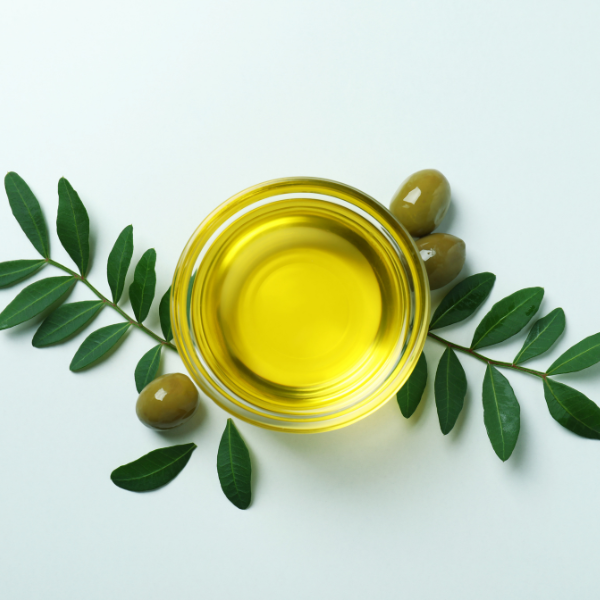‘Butter is bad, butter is good, coconut oil can be used for cooking, canola oil contains omega-3 fatty acids and should replace sunflower oil, olive oil is super healthy for you but shouldn’t be used for cooking.’ This is just some of the information that you may be bombarded with by the media.

A recent study has provided the answer! This study aimed to score the quality of dietary oils and fats and found that extra virgin olive oil is ranked as the healthiest option in terms of quality and health outcomes.¹
Fat is a macronutrient that performs many functions in the body and needs to be obtained from the diet. We can get edible oils from a variety of sources, including nuts, seeds, and fruits, and their nutritional quality can differ significantly. Many people are unaware of the nutritional differences between oils, which makes it difficult for them to make informed decisions about which one to use.
The smoke point of oils refers to the temperature at which oils start to ‘burn’ and smoke and has been used to classify oils. However, this measure doesn’t consider the nutritional composition of the oils and the recommendations surrounding each component. Thus, a nutrition quality score was created according to criteria based on beneficial components set out in dietary recommendations provided by international food and health organisations. The total fat, fatty acids (such as saturated fats, monounsaturated fats (MUFA), polyunsaturated fats (PUFA), and trans-fat), tocopherols and phytoestrogens were evaluated according to the dietary reference values and health claims published by the Food and Agriculture Organization of the United Nations (FAO) / World Health Organization (WHO), the European Food Safety Authority (EFSA), and the United States Department of Agriculture (USDA) / Food and Drug Administration (FDA).

"So how do you choose what to use with all this seemingly conflicting information?"
Points were then assigned to each component, based on their amount in each oil. These points were added up and the fats and oils were then classified. Out of the 32 oils and fats that were evaluated, extra virgin olive oil (EVOO) was ranked as the best.
Oils and fats with a high saturated fat content were ranked with a poorer nutritional quality score.
Coconut oil received the lowest score due to the high content of saturated fat, and very low presence of phytosterols and tocopherols. Meta-analyses (studies that evaluate the results of many studies) show that consuming coconut oil increases serum lipid concentrations more than oils rich in MUFA and PUFA.
Margarine was also ranked low as some of the included products had a relatively high content of trans-fat. However, many margarines are enriched with vitamin E and/or phytosterols, which may contribute to a higher score.
The unique composition of EVOO ranked this oil as the best nutritionally. EVOO is mostly made up of oleic acid (55 – 83 g/100 g), and this is associated with a decreased risk of heart disease. EVOO also contains linoleic acid, α-linonlenic acid, tocopherols, and hydroxytyrosol, which have further health-promoting effects. Hydroxytyrosol protects LDL-cholesterol (bad cholesterol) from oxidative damage, and can only be found in EVOO. Though cooking does reduce the content of polyphenols, the health benefits of EVOO appear to be maintained.
It should however be noted that the smoke point and resistance to oxidation were not considered as part of the score, and this could influence the nutritional quality over time. Furthermore, the composition of some oils can vary greatly, which could affect the score ratings. CLICK HERE to read some tips about how to include EVOO in your daily eating pattern

For more information on the study, refer to the reference below.
So, what is the takeaway message?
A recent study aimed to provide clarity amid conflicting information about dietary oils and fats, ranking extra virgin olive oil (EVOO) as the healthiest option in terms of quality and health outcomes. The study introduced a nutrition quality score based on beneficial components outlined in international dietary recommendations. EVOO’s unique composition, including oleic acid and health-promoting compounds like tocopherols and hydroxytyrosol, contributed to its top ranking. The study highlighted the importance of considering nutritional composition, beyond the smoke point, to make informed choices about cooking oils.
CONCLUSION
This nutritional quality score can be used to promote healthy choices for consumers, as well as advise food producers on what to include in their products.
Surprise-surprise (or not), EVOO is considered to be the healthiest oil of all! The unique composition EVOO and its inclusion in a healthy eating pattern promotes heart health and reduces the risk of all-cause mortality. EVOO should replace the intake of oils high in saturated fat. Not sure of how much or how to include EVOO in your eating pattern? We’ve got you covered! Take a look at this article.
REFERENCES
- García-González A, Quintero-Flórez A, Ruiz-Méndez MV, et al. 2023. Virgin olive oil ranks first in a new nutritional quality score due to its compositional profile. Nutrients, 15:2127. Available here.



